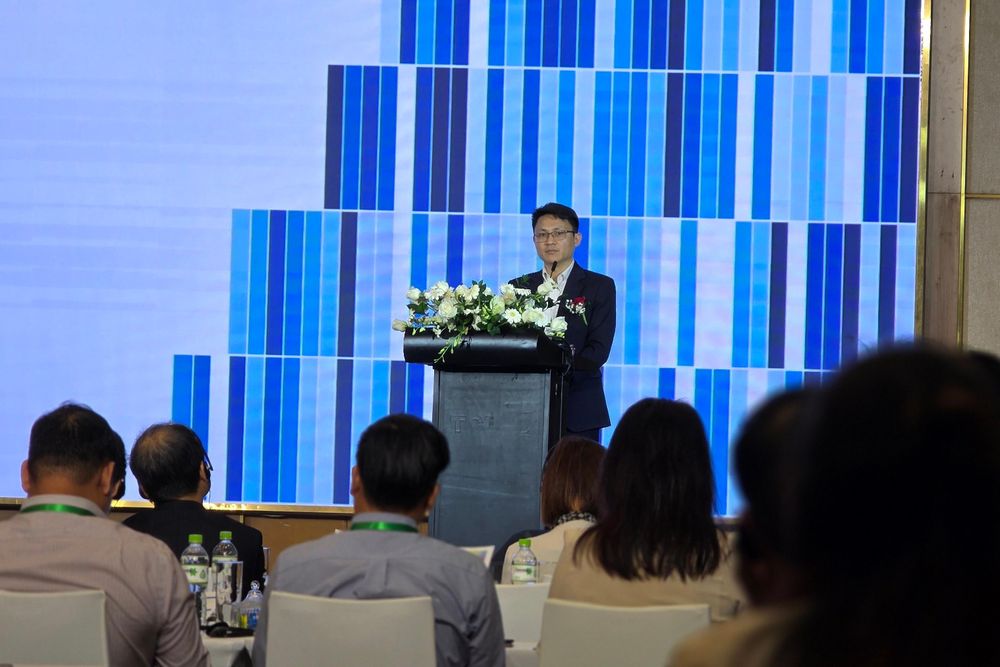NIC representative said that Vietnam has a mechanism to support cash for businesses in the high-tech and digital technology fields, expecting Japanese investors to participate in more cooperation.

Vietnam is making efforts to call for investment in the digital economy, in order to promote the country's innovation process. Photo: Quynh Danh.
Speaking at the Sustainable Transformation Solutions Conference 2025 organized by Nikkei BP Financial Magazine in collaboration with the Institute for Management and Technology Development (AOTS) on February 18 in Ho Chi Minh City, Mr. Vo Xuan Hoai, Deputy Director of the National Innovation Center (NIC) expressed his desire to have the presence of large-scale Japanese innovation centers in Vietnam.
A series of special mechanisms and policies to attract investment in the digital economy
According to Mr. Hoai, Vietnam is particularly interested in the semiconductor industry and artificial intelligence in the digital economy as well as the country's innovation process.
Meanwhile, cooperation activities between Vietnam and Japan in innovation and the digital economy are diverse, thereby helping to make the relationship between Vietnam and Japan more vibrant.
In 2024, Vietnam and Japan launched the Digital Transformation Association, which includes more than 100 digital technology enterprises located in Tokyo along with thousands of Japanese employees.
At the same time, Vietnam has worked with the Japanese Embassy to implement joint initiatives between the two sides, especially helping to connect investors from both countries. Thereby, Vietnam has the opportunity to attract investment from Japanese enterprises, especially in the digital economy.
Notably, on February 19, Vietnam will cooperate with Japan and relevant agencies to send a series of enterprises and local leaders of Japan to participate in discussions on initiatives to develop the semiconductor industry and semiconductor human resources. This is an opportunity to promote and deepen the relationship between the two sides.
In the coming time, Mr. Hoai suggested that the two sides continue to cooperate, focusing on developing high-quality human resources and promoting the digital economy.

Mr. Vo Xuan Hoai, Deputy Director of NIC, spoke at the conference. Photo: Anh Nguyen
Currently, the Vietnamese Government is determined to concretize Resolution 57-NQ/TW of the Politburo on breakthroughs in science, technology, innovation and national digital transformation. Vietnam also sets a target that by 2030, the rate of enterprises with innovation activities will reach 40%.
Regarding the digital economy, in 2024, the proportion of the digital economy is estimated to reach 18.3% of GDP, with a growth rate exceeding 20%/year. This shows that Vietnam has made great efforts in developing the digital economy.
Sharing about the advantages of businesses investing in Vietnam in the coming time, the leader of NIC emphasized that in Decree 182 on the establishment, management and use of investment support funds recently issued, Vietnam has for the first time a mechanism to support cash for businesses in the fields of high technology, digital technology and digital economic development.
Specifically, businesses will be supported with initial investment costs or annual operating costs. This helps create competition between businesses.
On the other hand, the development of digital infrastructure will also be carried out in parallel with the development of the digital economy. Vietnam is gradually completing the North-South expressway project, and Long Thanh airport will also be basically put into operation in 2026.
In addition, Vietnam has one of the highest Internet usage rates in the world, has high transmission speeds and is completing the fiber optic cable system. In addition, data centers are also being deployed by Vietnam and cooperated with large corporations.
"Vietnam is building a very good electricity infrastructure system, the North-South power transmission line is gradually being completed along with solar power and renewable energy. The National Assembly is also discussing nuclear energy," Mr. Hoai added.
Currently, Vietnam has 3 large-scale high-tech parks in Ho Chi Minh City, Hanoi and Da Nang. In addition, neighboring provinces such as Binh Duong and Dong Nai are also gradually planning suitable areas to develop high-tech parks and innovation.
Regarding human resources for digital economic development, the Government has issued a separate Directive to help develop human resources for the digital economy. At the same time, Vietnam is perfecting laws on telecommunications, data, as well as Decrees related to promoting digital economic development.
From the above policies, Vietnam has achieved outstanding results. Accordingly, Vietnam's digital product exports increased from 113.5 billion in 2021 to 117 billion in 2023. Notably, many digital technology corporations have also invested in Vietnam's major R&D centers such as NVIDIA, Samsung, Meta, Google, etc.
Regarding Ho Chi Minh City, Vice Chairman of the City People's Committee Vo Van Hoan said that the city aims to become a leading center in AI, digital economy, digital society, finance and technology education by 2030. At that time, the proportion of the digital economy is expected to reach 40%.
"Innovation is not only applied to the economy but also helps develop society. Ho Chi Minh City will be the place to create a driving force for businesses to transform digitally as well as innovate for the quality of life of the people," Mr. Hoan shared, and expressed his desire to continue receiving cooperation from Japanese businesses in the coming time.
Japan can be the best partner in Vietnam's digital transformation
Also at the conference, Japanese Ambassador Ito Naoki said that many Japanese enterprises have actively invested in Vietnam, not only focusing on Hanoi and Ho Chi Minh City, but also expanding to other provinces and cities. Some units are also cooperating with Vietnamese enterprises to expand their business activities.
Among many fields, he said that the potential for cooperation between Japan and Vietnam in the digital economy is huge.
He assessed that the digital industry in Vietnam is developing rapidly. Revenue in 2024 is forecast to reach 152 billion USD and has grown by about 36% compared to 2019. In Vietnam's economic development strategy, the digital economy is also highly appreciated and has a very important position.
"Japan and Japanese enterprises can become the best partners in promoting Vietnam's digital transformation," Mr. Ito Naoki emphasized.
When Japanese enterprises cooperate with IT-related companies in Vietnam, especially startups, they can create new trends in innovation, helping to improve competitiveness. He also affirmed that Japan wants to promote sustainable growth, towards a long-term development future.
Anh Nguyen